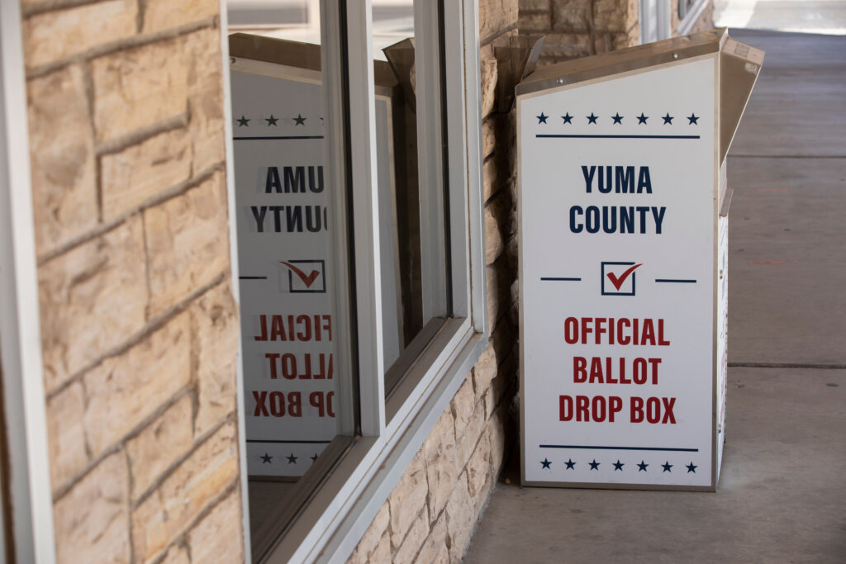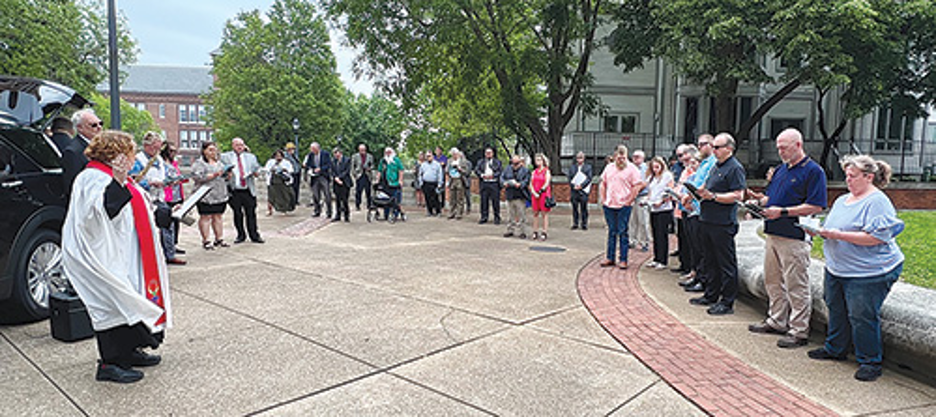|
|
Arizona Court Rejects Right-Wing Challenges to Drop Boxes and Signature Matching Rules |
|
An Arizona judge has rejected a right-wing group's attempt to ban ballot drop boxes and force the state to adopt stricter rules for signature verification. As a result, ballot drop boxes and the current signature matching rules will remain in place. The decisions are wins for Arizona voters and the Arizona Alliance, which intervened in the cases to defend the state’s mail-in voting rules.
The Thursday joint ruling resolved two cases brought by the right-wing group Arizona Free Enterprise Club and Restoring Integrity and Trust in Elections, which was established by former U.S. Attorney General Bill Barr, along with Mary Kay Ruwette, a retired HR specialist from Yavapai County who sued in her capacity as a voter. |
|
|
One of the lawsuits at issue in the order challenged the use of drop boxes and the other challenged signature matching policies included in the Arizona Election Procedures Manual. The joint ruling means |
|
that the Arizona Election Procedures Manual's (EPM) instruction to use previous ballot envelopes when checking a voter’s registration record is still valid, and the EPM’s description of “drop boxes” as not always staffed by an in-person election worker is still valid.
The plaintiffs unsuccessfully argued that drop boxes "lack crucial protections afforded to USPS mail collection boxes." A judge had denied an injunction against the use of drop boxes last year, and on Thursday the case was dismissed on summary judgment.
In Thursday’s order the judge also held that because the Arizona Secretary of State has recently clarified that election officials can match signatures on early mail-in ballots with those on voters’ mail-in ballots from prior elections, the Arizona Free Enterprise Club’s legal challenge must be denied.
“This is a real victory for older Arizonans and a defeat for those who are working day and night to make it harder for older Americans to cast a ballot,” said Richard Fiesta, Executive Director of the Alliance. “Alliance members in Arizona and all states will continue to go to court if we must to prevent voter suppression.” |
|
Sen. Sanders Investigates “Outrageously Overpriced” Ozempic and Wegovy |
|
Sen. Bernie Sanders (VT), chair of the Senate Health, Education, Labor, and Pensions (HELP) Committee, has opened an investigation into a medication he calls "outrageously overpriced." Sanders sent a letter formally requesting information to Lars Fruergaard Jørgensen, CEO of Novo Nordisk, whose company makes Ozempic, used to treat Type 2 diabetes, and also to treat obesity in adults under the name Wegovy.
The Senator noted that Novo Nordisk charges $969 in the United States for one month of Ozempic but just $155 in Canada and $59 in Germany. Similarly Novo Nordisk charges Americans $1,349 for one month of Wegovy but just $140 in Germany and $92 in the United Kingdom.
Researchers at Yale University estimate that both of these drugs can be profitably manufactured for less than $5 a month. The International Monetary Fund figures show that Novo Nordisk, based in Denmark, has a market value larger than the country's entire gross domestic product.
“Pharmaceutical corporations are making record profits, lining the pockets of their executives and shareholders. Meanwhile, patients have struggled to afford the drugs they need to stay healthy,” said Executive Director Fiesta. “This is why Medicare must be able to negotiate prices for even more drugs and why the industry is trying to repeal the law.” |
|
Rep. Gallego, Sen. Casey Introduce New Social Security Expansion Bill |
|
Rep. Ruben Gallego (AZ) has introduced the “Boosting Benefits and COLAS for Seniors Act,” which could mean higher benefits for seniors by changing Social Security’s cost-of-living adjustment formula. The bill aims to make Social Security more reflective of the everyday costs incurred by seniors. Sen. Bob Casey (PA) introduced companion legislation, S. 3974, in the Senate.
The legislation would change the COLA formula by using the consumer-price index for Americans aged 62 or older (CPI-E), which was launched in 1983 and better reflects the actual things older adults spend their money on. For example, medical expenses are weighted more heavily in the CPI-E than they are with the consumer-price index for Urban Wage Earners (CPI-W) — the formula currently used. The CPI-W for 2024 was 3.2%, but the CPI-E was 4%.
“The Alliance thanks Rep. Gallego and Sen. Casey for their leadership in introducing this legislation,” said Joseph Peters, Jr., Secretary-Treasurer of the Alliance. “We need a better formula to calculate COLAS, but we also need to expand Social Security and increase benefits by requiring that high-income Americans pay their fair share of taxes into the system.” |
|
Alliance’s 2024 Regional Meetings Begin in Less Than Three Weeks - Are You Registered? |
|
You’re invited!
Join us at our regional meetings and strengthen your skills as a retiree activist. Make sure you’re ready to help elect pro-retiree candidates this November and win the fight for retirement security.
Attendees will elect regional Alliance Executive Board members, hear from local labor leaders and elected officials, and participate in interactive workshops and training sessions. The meetings and dates are: Midwest, May 15-16, 2024; Western, June 5-6, 2024; Southern, June 11-12, 2024; and Northeast, July 30-31, 2024. Click here to find your region and register.
All meeting attendees will participate in four interactive workshops with fellow retiree activists.
The last day to book the Courtyard Detroit Metro Airport Romulus hotel room for the Midwest Regional Conference is Friday, May 3, 2024. For more information, please contact Joni Jones by calling 202-637-5377 or e-mail [email protected]. |
|
KFF Health News: Biden Administration Sets Higher Staffing Mandates. Most Nursing Homes Don’t Meet Them. |
|
The Biden administration finalized nursing home staffing rules Monday that will require thousands of them to hire more nurses and aides — while giving them years to do so.
The new rules from the Centers for Medicare & Medicaid Services are the most substantial changes to federal oversight of the nation’s roughly 15,000 nursing homes in more than three decades. But they are less stringent than what patient advocates said was needed to provide high-quality care.
Spurred by disproportionate deaths from covid-19 in long-term care facilities, the rules aim to address perennially sparse staffing that can be a root cause of missed diagnoses, severe bedsores, and frequent falls.
“For residents, this will mean more staff, which means fewer ER visits potentially, more independence,” Vice President Kamala Harris said while meeting with nursing home workers in La Crosse, Wisconsin. “For families, it’s going to mean peace of mind in terms of your loved one being taken care of.”
When the regulations are fully enacted, 4 in 5 homes will need to augment their payrolls, CMS estimated. But the new standards are likely to require slight if any improvements for many of the 1.2 million residents in facilities that are already quite close to or meet the minimum levels.
Read more here. |
|
Alliance Celebrates Workers Memorial Day this Sunday |
|
Every April 28, the unions of the AFL-CIO observe Workers’ Memorial Day to remember those who have been injured, contracted an illness, or died as a result of doing their jobs over the past year. Each day, more than 340 workers are killed and more than 6,000 suffer injury and illness because of dangerous working conditions that are preventable.
This year marks the 54th anniversary of the enactment of the Federal Occupational Safety and Health Act (OSHA), which was enacted on April 28, 1970. The AFL-CIO has released its 2024 Death on the Job report to coincide with the occasion.
“The Biden administration has improved transparency of information about loved ones lost on the job to honor them and to prevent future tragedies,” said Robert Roach, Jr., President of the Alliance. “The administration has bolstered enforcement initiatives to hold employers accountable when they violate the law by endangering workers. It has also strengthened policies to protect vulnerable workers with the greatest risk of dying on the job and to prevent employer retaliation.”
One of the Alliance chapters marking the date, the Missouri Alliance for Retired Americans, will hold its 2024 Workers Memorial Day Interfaith Prayer Service and Brunch this Sunday. It will be the 44th annual Labor Mass in St. Louis, one of the longest running Workers Memorial Day events in the nation.
“The Missouri Alliance is honored to be able to help continue this tradition and coordinate the Labor Mass honoring workers lost and committing ourselves to the fight for a safer future,” said Mike Louis, President of the Missouri Alliance for Retired Americans, retired IAM member, and retired president of the Missouri AFL-CIO. |
|
|
REMEMBERING WORKERS: The Rev. Dr. Teresa Mithen Danieley leads an interfaith prayer outside the Shrine of St. Joseph at last year’s Workers Memorial Day Interfaith Prayer Service remembering workers lost in 2022-23. – Labor Tribune photo |
|
Thanks for reading. Every day, we're fighting to lower prescription drug prices and protect retirees' earned benefits and health care. But we can't do it without your help. Please support our work by donating below. |
|
|
|
|
Alliance for Retired Americans | 815 16th Street, NW | Washington, DC 20006 | www.retiredamericans.org



